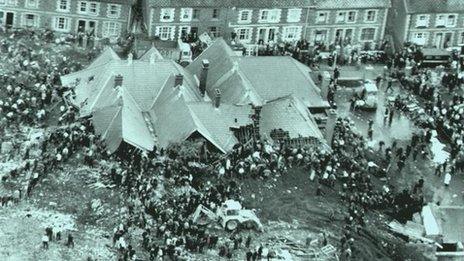Aberfan disaster: Edinburgh Fringe play faces cancellation calls
- Published

On 21 October 1966, 144 people, including 116 children, died when a coal waste tip slid down a mountain and engulfed a school and surrounding houses
A survivor of the Aberfan disaster has called for a controversial play about the event at the Edinburgh Festival Fringe next month to be cancelled.
Children of Mine tell the story of the October 1966 disaster in which 144 people, mostly children, died.
Bernard Thomas, who was among the pupils to escape but who lost two relatives, said survivors had not been consulted.
Writer and director Mark Jermin said the play was a "fitting tribute".
A group of teenagers from south Wales are set to perform the play which uses fictional characters to tell how a coal waste tip slid down a mountain and engulfed Pantglas Junior School and surrounding houses.
Mr Thomas said: "It does rankle rather a lot that there was no real consultation, the people weren't really consulted, and nobody knows how the subject is being treated," he said.
"I think it should be cancelled myself, in light of the way things have happened. We get enough publicity, there are enough memories about the disaster as it is, without having it brought up in this way as well."
But Mark Jermin defended the decision to stage the show.
"Obviously it's had some controversy around it, but I think it's a very raw, evocative subject matter, and for it still to be that raw there needs to be some healing. And in my opinion it's a strong and a fitting tribute to something that happened."
Children of Mine, which bills itself as "a tribute to Aberfan, its people and their sorrow," will be performed in Edinburgh from 3 to 24 August.
Its promotional material says the play "plummets its audience into the thick black slurry of devastation, crushing its characters' physical and mental strengths and stabilities".
The play attracted anger from some Aberfan survivors when it was first performed last year under a different title and behind closed doors.
'Our history'
Mr Jermin said: "Last year it was a workshop production which was just for students and parents, and this time it is a re-shaped, re-worked production with a smaller cast.
"It's quite intense, and obviously the subject matter is very, very raw, but as an artist I just feel that it opens the lines of communication and brings the subject to the forefront."
Gareth Jones, who also survived the disaster, said he supported attempts to tell the story of what happened in Aberfan but felt the community had not been consulted on this occasion.
"I think it's just people jumping on the bandwagon, making money out of our misery.
"This is what I don't like. Yes, I want the story to be told of Aberfan for hundreds of years, it's part of our history, but I honestly don't think people should make money out of our misery.
"I think they should have come and consulted people first, like every other production company that comes here and does other stories. They would be welcomed with open arms," he said.
One of the actresses in the play lives in Aberfan. Samantha Spragg said she accepted that some would be unhappy with it.
"Being from the village myself it's very hard for me, because I don't want to upset anyone that I know.
"I just think that it's a story that should be told because there are so many people who don't [know about] it, and I just genuinely think that it's something that everyone should know about because it's such an important part of Welsh history."
- Published19 October 2012
- Published9 October 2012